不管是纯视觉还是多传感器融合方案,摄像头几成智能汽车标配。作为感知层核心传感器,随ADAS功能持续升级,车载摄像头迎来量价齐升机遇。
车载摄像头产业链主要涉及上游材料、中游元件和下游产品三个主要环节。

上游包括光学镜片、滤光片、保护膜、胶合材料、CMOS图像传感器、DSP信号处理器、模组封装等;中游可根据安装位置的不同分为前视摄像头、环视摄像头、后视摄像头、侧视摄像头、内置摄像头等;下游作为部件广泛应用于汽车产业。
从车载摄像头成本端分析,CMOS芯片占比最大,超过一半;另外模组封装占25%,光学镜头占15%左右。
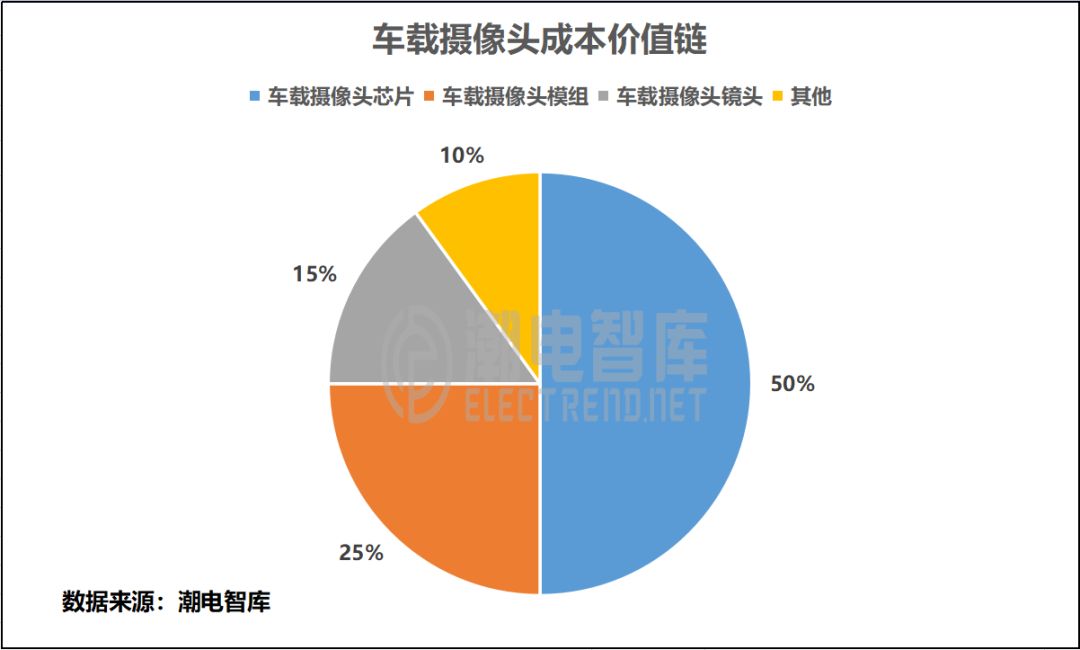
根据潮电智库了解,受互联网造车思维影响,汽车供应链级别概念非常模糊,上游供应商可以向下游整车厂提供完整的摄像头产品。目前市场份额较大占有者主要为一线汽车Tier1,其客户群基本覆盖了全球主要的整车公司。
01 CMOS图像传感器
相比在手机和安防领域的应用,车载CMOS主要对安全性、可靠性以及图像质量中的低照度、动态范围和功能安全方面有更高要求。
车载CMOS的应用场景主要分为三种,一是360环视、倒车影像、行车记录仪等;二是ADAS、自动驾驶等;三是DMS等座舱内应用。根据市场趋势判断,未来市场增长点主要是来自于ADAS、自动驾驶等领域。
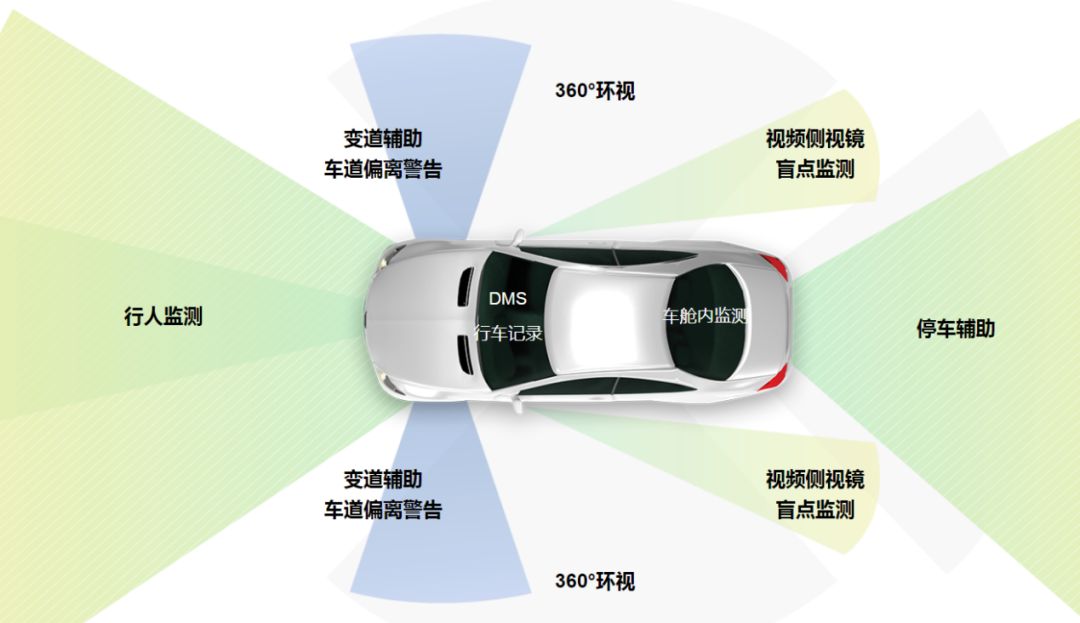
据潮电智库了解,按照L1-L5不同驾驶等级,每辆汽车对于CMOS图像传感器的需求量将超过20颗。
市场数据显示,2021年全球车载CMOS市场总值为38.1亿美元,其中前装的市场总值为31.4亿美元。预计到2026年,全球车载CMOS市场总值将会达到90.7亿美元,其中前装市场总值将达82.8亿美元。
目前,车载CMOS主要供应商包括安森美、索尼、豪威集团、思特威、派视尔、格科微、三星等企业。
安森美
收购普拉斯CMOS业务部、图像传感器设备制造商Truesense Imaging和Aptina Imaging,让安森美获得大量相关专利和技术。其车载CMOS多年稳坐全球第一的位置,主要优势在于2M及以下市场,这也是目前需求最大的品类。

2022年安森美营收83.3亿美元,其中汽车业务收入达33.6亿美元,占总收入40%。
思特威
2020年收购Allchip后,思特威于2021年启动车载CMOS系列产品的研发,应用场景含括360度全景影像、行车记录仪、驾驶室舱内监控、电子后视镜、ADAS、电子后视镜等领域,并同年推出前装产品SC120AT,实现了整车项目的批量出货,获得多个车厂新项目定点。
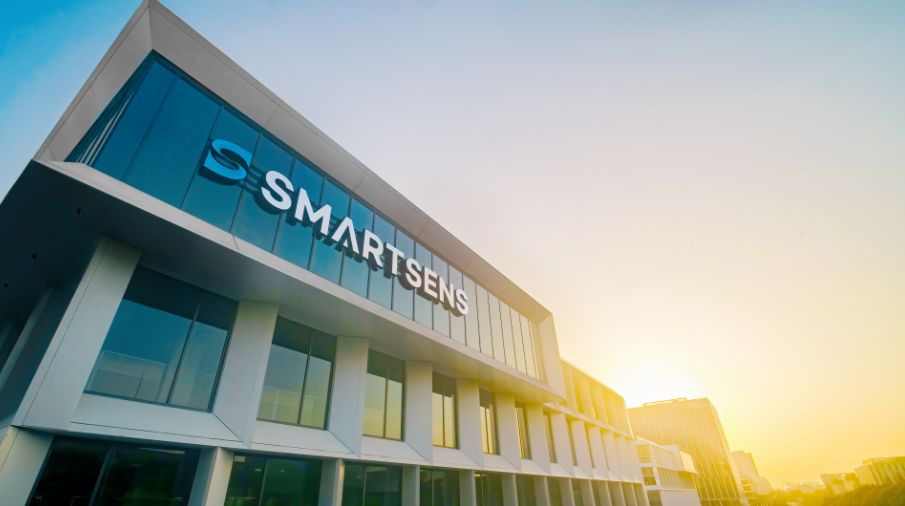
公司2022年中报显示,汽车电子收入6599万元,较上年同期增加15.2%,占主营收入的比例为 6.5%。
02光学镜头
光学镜头中包括光学镜片、滤光片等光学器件,对摄像头的成像质量起到了关键作用。光学镜片一般来说有玻璃和塑胶两种材质,玻璃镜片成本较高,但透光率高、热膨胀系数低;塑胶镜片则成本较低,但透光率稍低、热膨胀系数高。
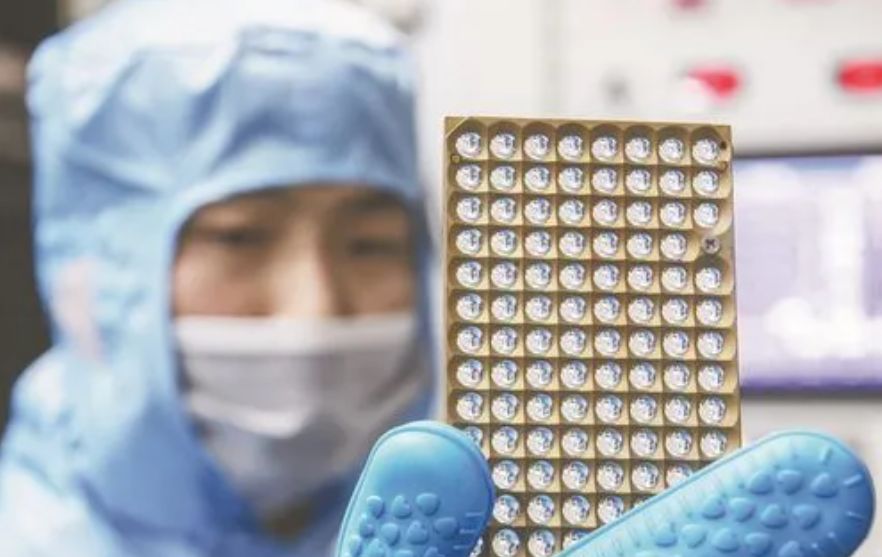
由于车载环境温度变化大,而温度会影响镜片光学性能,因此具备良好热稳定性的玻璃镜片更适合车载镜头。考虑到成本因素,同时采用两种材质镜片的玻塑混合镜头可以兼顾成本和性能。一些厂商通过采用特殊的塑胶材料和镀膜工艺,解决外露面塑料镜片的可靠性问题,实现可以满足车载用途的全塑料镜头。
目前,车载光学镜头的主要供应商有舜宇、联创电子、欧菲光、宇瞳玖洲光学、弘景光电、大立光等企业,其中以前两者为代表。
舜宇
以超过30%的市占率,多年稳居车载镜头行业第一。根据潮电智库统计,车载镜头2022年出货量约7900万颗,同比增长16%。

截至去年上半年,舜宇光学新研发完成多款500万像素玻塑混合舱内监控车载镜头,该类镜头可实现驾驶员监控和乘客监控二合一,并且获得了多家车厂的平台化项目。同时,300万像素玻塑混合车载镜头已实现量产。
舜宇车载镜头客户主要以Tier 1为主,包括博世、麦格纳、法雷奥、大陆等,与Mobileye等算法厂商合作密切。
联创电子
车载光学行业有一句流行语,“销量看舜宇,技术看联创”。联创是是国内领先的车载镜头和模组厂商,拥有模造玻璃-镜头-模组全产业链布局。
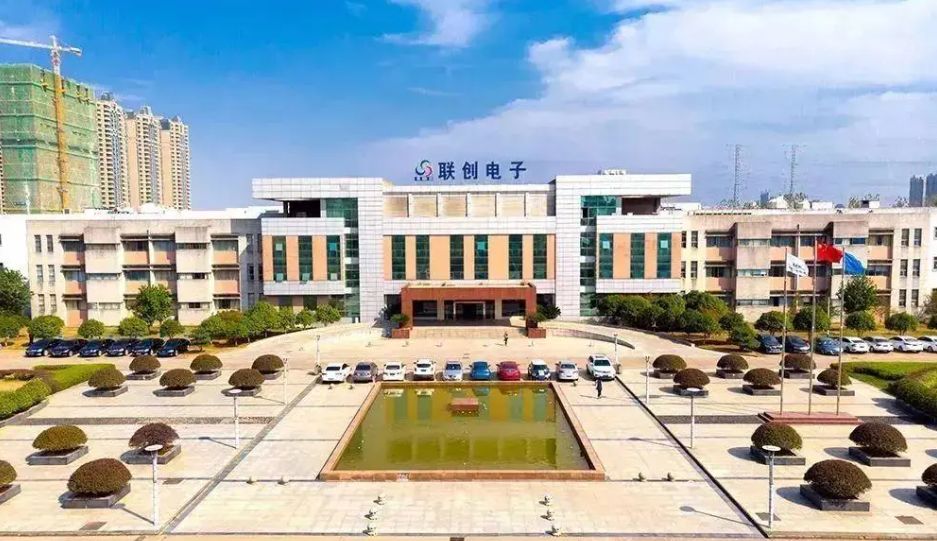
联创电子去年上半年车载镜头及模组营收同比增长910%。公司年产2400万颗智能汽车光学镜头及600万颗影像模组产业化项目正在加速建设,并计划于2025年底前形成车载镜头和影像模组各5000万颗的生产能力,满产后预计年销售收入近100亿元。
潮电智库从汽车产业链获悉,联创电子的8M车载镜头月交付量已经超过10万套,成为该产品全球最大的光学供应厂商。
03模组封装
早期车载摄像头对像素和规格要求较低,Tier 1厂商主要采用较低端的BGA封装技术。随着ADAS技术不断升级,车载摄像头小型化、高像素的趋势下,车载摄像头封装工艺更为复杂,逐步采用COB封装技术。
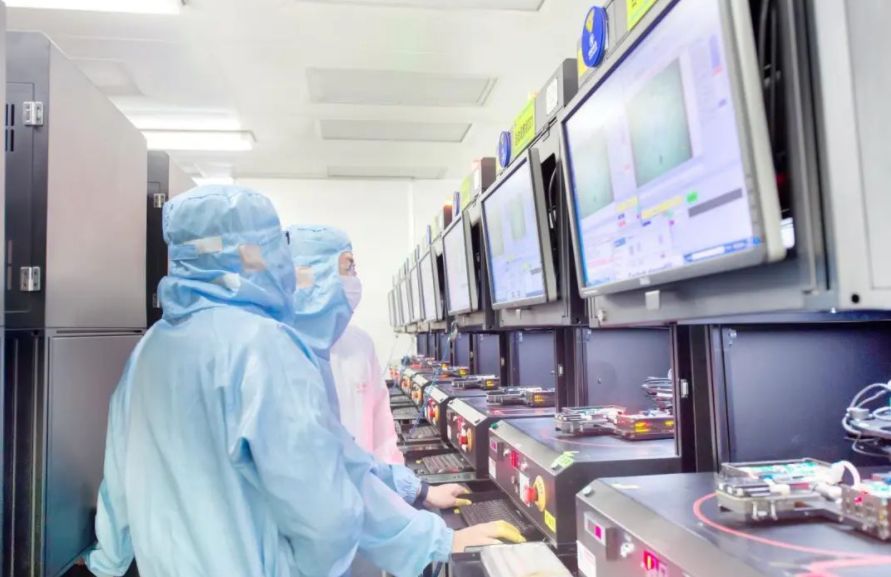
很多Tier1认为软件利润率要相比硬件更高,因此不再大规模投入到摄像头硬件业务。于是光学厂商逐渐承接摄像头模组封装业务,服务Tier1甚至直接供应主机厂。
以中国智能汽车发展和供应链成长速度,潮电智库估算,2025年会是国产车载模组对国外反超的时间节点。而且,国产十大车载模组厂商竞争梯队已经形成。
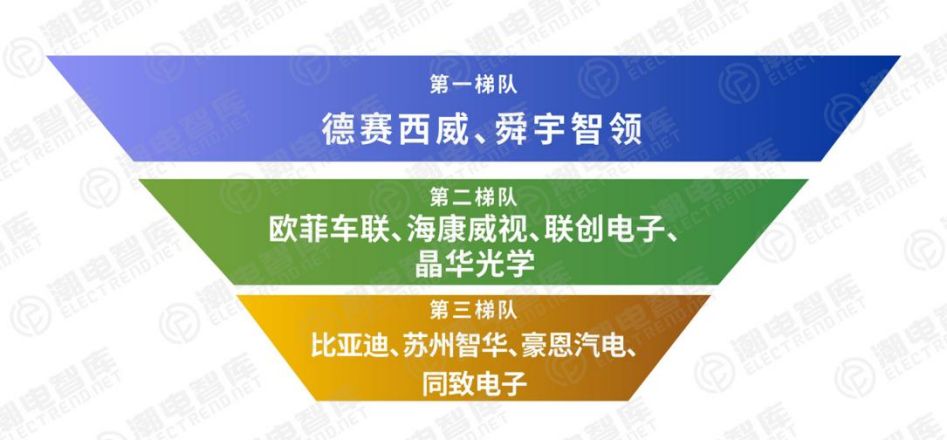
目前,车载摄像头模组的主要供应商包括松下、法雷奥、德赛西威、舜宇智领、海康威视、晶华光学、联创电子、欧菲智能车联、苏州智华、豪恩汽电、同致电子等企业。
德赛西威
作为传统汽车Tier1代表,目前摄像头只是其汽车电子业务的一个细分产品,但出货量已经稳居前三。德赛西威的核心竞争力,在于具备国内为数不多可提供域控制器的能力,其丰富的产品矩阵对于整机厂有着更大的吸引力。

目前德赛西威与大众集团、丰田汽车公司、马自达集团、沃尔沃汽车、一汽集团、上汽集团、吉利汽车、长城汽车、广汽集团、奇瑞汽车、蔚来汽车、小鹏汽车、理想汽车等国内外汽车制造商建立了良好的合作关系。
欧菲智能车联
欧菲光自2015年成立上海欧菲智能车联科技有限公司,布局智能驾驶、车身电子和智能中控,以光学镜头、摄像头为基础,延伸到毫米波雷达、激光雷达、抬头显示(HUD)、车身域控制器(BCM/BGM)等产品,目前已取得20余家国内车企的一级供应商资质。
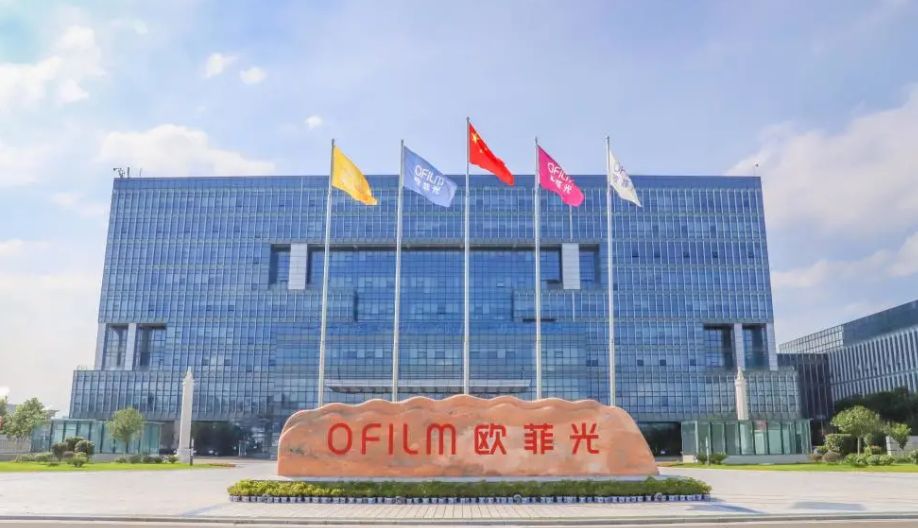
据欧菲光披露,公司车载摄像头产品进展较明显,其中2M前视三目,8M前视双目即将量产;3M和8M周视后视摄像头已量产;1M和2.5M环视摄像头均已量产;带加热功能的2M电子外后视镜摄像头已量产;舱内DMS和OMS摄像头,1M和2M均已量产,5M正在研发。
2023 Automotive Camera Industry Chain /upstream Enterprise Analysis
Whether it’s vision or multi-sensor fusion solutions, cameras are almost standard equipment for smart cars. As the core sensor of the perception layer, with the continuous upgrading of ADAS functions, car mounted cameras are facing opportunities for both quantity and price.
The automotive camera industry chain mainly involves three main links: upstream materials, midstream components, and downstream products.

Upstream includes optical lenses, filters, protective films, adhesive materials, CMOS image sensors, DSP signal processors, module packaging, etc; The midstream can be divided into front view cameras, surround view cameras, rear view cameras, side view cameras, built-in cameras, etc. according to the installation location; Downstream is widely used as a component in the automotive industry.
From the cost analysis of car mounted cameras, CMOS chips account for the largest proportion, exceeding half; In addition, module packaging accounts for 25%, and optical lenses account for about 15%.
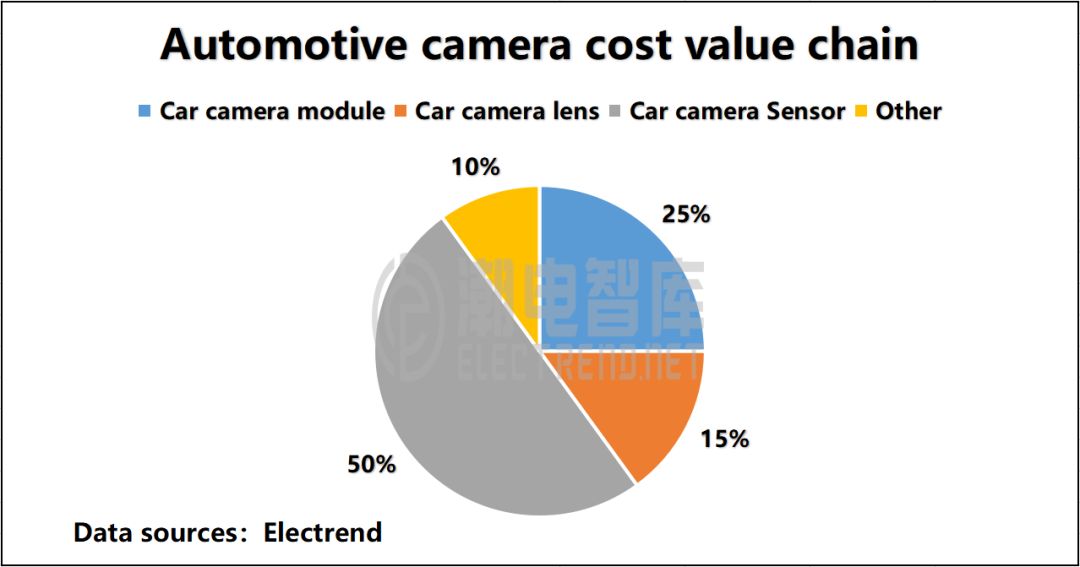
According to the Electrend, the concept of automotive supply chain level is very vague due to the influence of internet car manufacturing thinking. Upstream suppliers can provide complete camera products to downstream vehicle manufacturers. At present, the main market share holder is the Tier 1, a first tier car, with a customer base that basically covers major global vehicle companies.
1、 CMOS image sensor
Compared to applications in mobile phones and security, in car CMOS mainly has higher requirements for safety, reliability, low illumination, dynamic range, and functional safety in image quality.
The application scenarios of in car CMOS are mainly divided into three types: 360 surround view, reverse camera, driving recorder, etc; The second is ADAS, autonomous driving, etc; The third is the application of DMS and other cockpit applications. According to market trends, future market growth points will mainly come from fields such as ADAS and autonomous driving.

According to the Electrend, the demand for CMOS image sensors per car will exceed 20 according to different driving levels of L1-L5.
According to market data, the global in car CMOS market value in 2021 was 3.81 billion US dollars, of which the market value for front-end devices was 3.14 billion US dollars. It is expected that by 2026, the global in car CMOS market value will reach 9.07 billion US dollars, with the total value of the front-end market reaching 8.28 billion US dollars.
At present, the main suppliers of in car CMOS include companies such as Onsemi, Sony, Omnivision Group, smartsense, Pixelplus, Galaxycore, Samsung, etc.
Onsemi:Acquired the Plass CMOS business unit and image sensor equipment manufacturers Truesense Imaging and Aptina Imaging, allowing Ansemy to obtain a large number of related patents and technologies. Its in car CMOS has remained the world’s number one for many years, with its main advantage in the 2M and below market, which is currently the category with the highest demand.

In 2022, Onsemi’s revenue was $8.33 billion, of which the automotive business revenue reached $3.36 billion, accounting for 40% of the total revenue.
Smartsense: After acquiring Allchip in 2020, Sitewei launched the research and development of the in car CMOS series products in 2021. The application scenarios include 360 degree panoramic imaging, driving recorder, cockpit monitoring, electronic rearview mirror, ADAS, electronic rearview mirror, and other fields. In the same year, Sitewei launched the front end product SC120AT, achieving mass shipment of the entire vehicle project and obtaining new project targets from multiple car manufacturers.
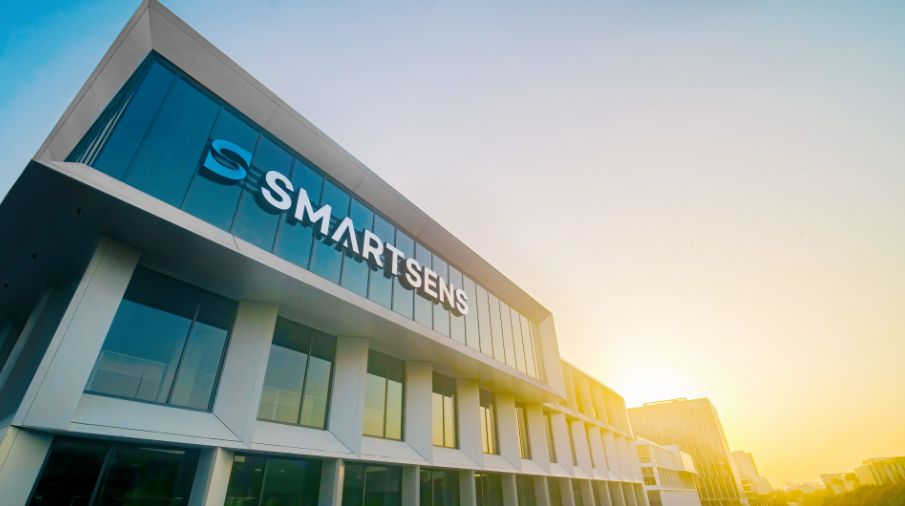
According to the company’s 2022 midterm report, the revenue from automotive electronics was 65.99 million yuan, an increase of 15.2% compared to the same period last year, accounting for 6.5% of the main revenue.
2、 Optical lens
The optical lens includes optical components such as lenses and filters, which play a crucial role in the imaging quality of the camera. Generally speaking, optical lenses are made of glass and plastic. The cost of glass lenses is high, but the transmittance is high and the coefficient of thermal expansion is low; The cost of plastic lens is lower, but the transmittance is slightly lower, and the coefficient of thermal expansion is high.
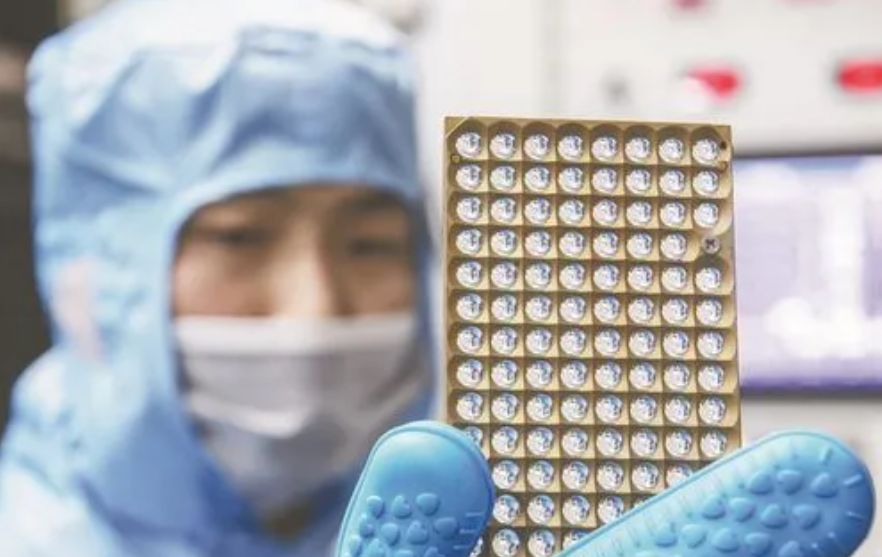
Due to the large temperature changes in the car environment, which can affect the optical performance of the lens, glass lenses with good thermal stability are more suitable for car lenses. Considering cost factors, using two types of glass plastic hybrid lenses simultaneously can balance cost and performance. Some manufacturers solve the reliability problem of exposed plastic lenses by using special plastic materials and coating processes, achieving all plastic lenses that can meet automotive applications.
At present, the main suppliers of automotive optical lenses include Sunny, LCE, Ofilm, YTOT, Hongjing, Largan and other enterprises, with the former two being representatives.
Sunny:With a market share of over 30%, it has consistently ranked first in the automotive lens industry for many years. According to the statistics of Electrend, the shipment volume of car mounted lenses in 2022 is about 79 million, a year-on-year increase of 16%.

As of the first half of last year, Shunyu Optics has newly developed and completed multiple 5 megapixel glass plastic hybrid cabin monitoring car lenses, which can achieve driver monitoring and passenger monitoring in one, and has obtained platformization projects from multiple car manufacturers. Meanwhile, the 3 megapixel glass plastic hybrid car lens has been mass-produced.
Sunny’s car lens customers mainly focus on Tier 1, including Bosch, Magna, Valeo, Continental, etc., and have close cooperation with algorithm manufacturers such as Mobileye.
LCE:There is a popular saying in the automotive optics industry, ‘Sales are determined by Sunny, technology is determined by LCE’. LCE is a leading manufacturer of automotive lenses and modules in China, with a complete industrial chain layout of molded glass lenses modules.
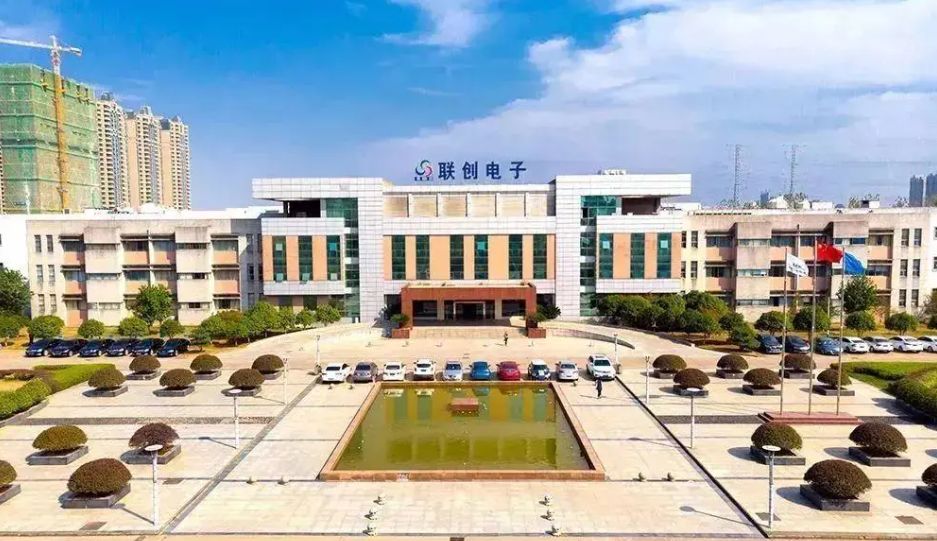
LCE’ revenue for car mounted lenses and modules increased by 910% year-on-year in the first half of last year. The company’s industrialization project of producing 24 million intelligent car optical lenses and 6 million image modules annually is accelerating construction, and plans to form a production capacity of 50 million each for car mounted lenses and image modules by the end of 2025. After full production, the expected annual sales revenue is nearly 10 billion yuan.
Electrend learned from the automotive industry chain that the monthly delivery volume of Lianchuang Electronics’ 8M in car lenses has exceeded 100000 sets, making it the world’s largest optical supplier of this product.
3、 Module packaging
Early car mounted cameras had lower requirements for pixels and specifications, and Tier 1 manufacturers mainly used lower end BGA packaging technology. With the continuous upgrading of ADAS technology and the trend of miniaturization and high pixel of car mounted cameras, the packaging process of car mounted cameras has become more complex, gradually adopting COB packaging technology.

Many Tier1 believe that software profit margins are higher than hardware, so they no longer invest heavily in camera hardware business. So optical manufacturers gradually took on the packaging business of camera modules, serving Tier1 and even directly supplying the host factory.
Based on the development speed of China’s intelligent vehicles and supply chain growth, Chaodian Think Tank estimates that 2025 will be a time point for domestic vehicle modules to compete with foreign counterparts. Moreover, a competitive echelon of the top ten domestic car module manufacturers has been formed.
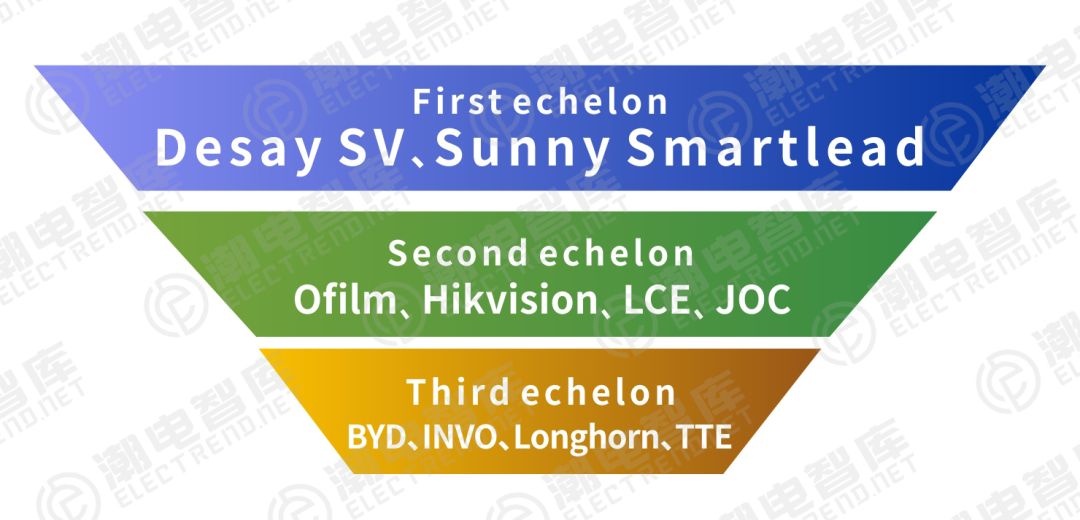
At present, the main suppliers of car mounted camera modules include Panasonic, Valeo, Desay SV, SUNNY, Hikvision, JOC, LCE, OFILM, INVO, Longhorn, Tungthin and other enterprises.
Desay SV:As a representative of the traditional automotive Tier1, the camera is currently only a segmented product in its automotive electronics business, but its shipment volume has stabilized in the top three. The core competitiveness of Desai Xiwei lies in its ability to provide domain controllers, which is one of the few in China. Its rich product matrix has greater appeal to the entire machine factory.

At present, Desay SV has established good cooperation relations with domestic and foreign automobile manufacturers such as Volkswagen Group, Toyota Motor Corporation, Mazda Group, Volvo Cars, FAW Group, SAIC Motor Corporation, Geely Automobile, Great Wall Motor, GAC Group, Chery Automobile, Weilai Automobile, Xiaopeng Automobile, Ideal Automobile, etc.
Ofilm: Since 2015, Ofilm has established Shanghai Oufei Intelligent Vehicle Connected Technology Co., Ltd., specializing in intelligent driving, body electronics, and intelligent central control. Based on optical lenses and cameras, Ofilm has extended to products such as millimeter wave radar, LiDAR, head up display (HUD), and body domain controller (BCM/BGM). Currently, it has obtained first-class supplier qualifications from more than 20 domestic car companies.
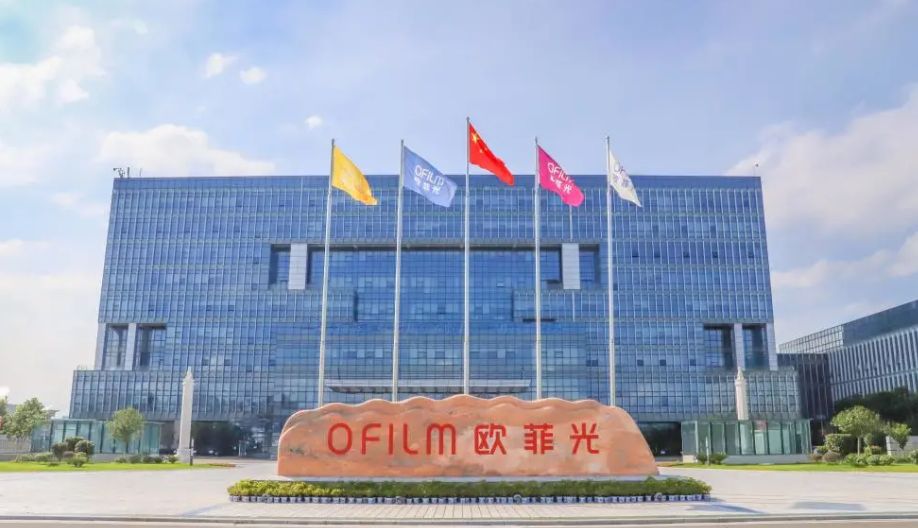
According to Ofilm, the company’s in car camera products have made significant progress, with 2M front facing three cameras and 8M front facing two cameras about to be mass-produced; 3M and 8M perimeter and rear view cameras have been mass-produced; Both 1M and 2.5M ambient cameras have been mass-produced; The 2M electronic exterior rearview mirror camera with heating function has been mass-produced; The DMS and OMS cameras in the cabin, both 1M and 2M, have been mass-produced, and 5M is currently under development.